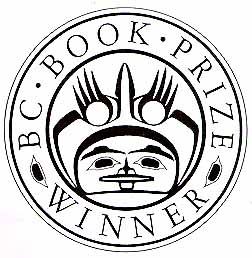 NetPac Communications Ltd.
NetPac Communications Ltd.
The B.C. Book prizes recognizes extraordinary achievements in British Columbian publishing and writing since 1985. Cash awards and plaques are presented in the catagories of fiction, regional writing, non-fiction, children's literature and bookseller's choice.
The West Coast Book Prize Society is looking ahead to the next decade as it celebrates significant books by British Columbian writers and publishers.
The publishing industry has expanded in economic might and size. It pumped an estimated $150 million into provincial coffers in 1992 (White 10). Now more than 1,500 authors and 250 publishers are active in British Columbia (Twigg 1).The province also has the highest book reading rate per capita in the country according to Statistics Canada.
The original fiction, regional writing, non-fiction, and the bookseller's choice prizes, worth one thousand dollars each, are the predecessors to the Eaton's B.C. Book Awards.
In 1985 a dozen volunteer organizers planned the awards nomination process, fund raised money, and arranged for a gala awards presentation in a seven-month period. They secured money from associations for printers, booksellers, publishers, and the City of Vancouver, as well as the provincial and federal governments. With a little over 100 nomination entries, the independent panel of peers culled from the library, book, publishing and educational sectors shortlisted three candidates. The winners received their awards and prize money at the gala dinner in October.
When Alan Twigg, the executive director of the West Coast Book Prize Society, and 11 others organized the first annual awards in 1985, they worried that the fundraising dinner would siphon money from their pockets if it did not sell out. They did not need to be concerned, because about 250 people attended the dinner.
The writers also praised the prizes. In a province famous for its poets, the prizes proved that British Columbia also had good prose writers according to the Wilson fiction winner Audrey Thomas (Signature 2). And, as an indication of the smallness and cohesive publishing and writing community, Alan Haig-Brown's book Fishing for a Living was nominated in the award named after his late father, who was an author and conservationist. That book won the 1994 Duthie Bookseller's choice prize. And Alan Haig-Brown judged the regional writing award named after his father in the previous year.
The tenth annual prizes has reached many landmarks: the corporate sponsors enriched the prize money treasury for a total of $12,000, the industry nominated a record number of 204 ballots, the first time that a First Nations publisher won an award. In the previous year, First Nations authors won the Haig-Brown regional and the Egoff children's prizes. Both poetry and children's literature are recognized in separate prizes. The attendance at the dinner and the operating budget of the non-profit administrative society has doubled. And Penticton hosted the presentation dinner for the first time in 1993, symbolizing the province-wide nature of the literature awards.
Media coverage of the B.C. Book Prizes includes the Georgia Straight, free advertisements in the Vancouver Sun and Province newspapers, the Victoria Times-Colonist, a Canadian Press wire story and a Knowledge Network television broadcast.
But many award-winning publishers are not aggressive enough in promoting its achievements. In the summer 1993 issue of B.C. Bookworld, only Douglas & McIntyre congratulated its authors in two separate ads. The Raincoast and Talonbooks, which both had award-winning authors, did not even place ads.
The publishers's inability to use publicity to their advantage is a lost opportunity to grasp consumer attention to high quality B.C. books. For example, a blurb or medallion logo printed on the later editions of the books would raise the profile of the B.C. Book Prizes. Public relations agents with booksellers could join together for a post-awards marketing blitz of authors signing books, and displaying posters and books prominently.
The West Coast Book Prize Society, the administrator of the prizes, is to be commended for saluting author and essayist George Woodcock, and initiating an arts centre for intellectual freedom named after him. But its efforts in encouraging new writers and poets, who are people of colour, are sorely lacking.
Despite the challenges of publicizing the prizes more, the organizers enjoy the fruits of a groundbreaking decade of labour. The B.C. Book Prizes represents mature publishing and writing communities, and their recognition of extraordinary achievement.
"And now we are ten." B.C. Bookworld Summer 1994.
B.C. Book Prizes news release. April 30, 1985.
B.C. Book Prizes news release. May 3, 1985.
B.C. Book Prizes programme. May 7, 1994.
"Ladies and Gentlemen..." B.C. Bookworld Summer 1993.
"A Prize Event: the B.C. Book Prizes." Signature Fall/Winter 1985: 1-5.
Robson, Peter. "Haig-Brown Makes Prize Catch." B.C. Bookworld Summer 1994.
10th B.C. Book Prizes. May 7, 1994. Vancouver, BC
White, Howard. "Wild about Harry" B.C. Bookworld Summer 1993.
The Ethel Wilson Fiction Prize
The Hubert Evans Non-Fiction Prize
The Dorothy Livesay Poetry Prize
The Sheila A. Egoff Children's Literature Prize
The Bill Duthie B.C. Booksellers' Choice Award
E-mail your feedback to: Brenda Wong
Originally written Nov. 7/94. Revised Dec. 6/95.
 NetPac Communications Ltd.
NetPac Communications Ltd.